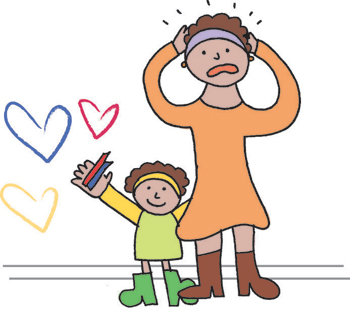
Remember this point so that you won’t become discouraged. Children quite often don’t trust that adults are really willing to listen to them and take them seriously. It may take some time for them to get used to this. At first they may try to use this new power to be hurtful and punishing, because this is the model they have been used to.
Children are used to getting certain responses from adults. When we change our responses, they will probably exaggerate their behavior (get worse) in their effort to get us to respond like we are supposed to. This is the kick the soda machine effect. When we put money in the soda machine and a soda doesn’t come out, we kick and pound to try and get it to do what it is supposed to do.
Although misbehavior might get worse when Positive Discipline skills are first used, you will notice that there is a leveling off before the child misbehaves again. When a child experiences that his manipulation tactics don’t work, he or she will probably test again— just to make sure. Misbehavior becomes less intense, with longer leveling off periods, when Positive Discipline is used consistently.
When we use firmness with dignity and respect, children soon learn that their misbehavior does not get the results they expect, and they are motivated to change their behavior, with their self-esteem in tact. Once we realize this, going through the times when behavior gets worse for a short period is not as bad as the constant hassles of power struggles with an excessively controlling approach.
Have compassion for yourself when you make mistakes—and learn from them. I have been learning from mistakes for over 30 years since I first wrote Positive Discipline. Even though I make many mistakes, I love these principles because they are wonderful guidelines to help me get back on track every time I get lost.
Before I learned to have compassion for myself, I was very hard on myself every time I didn’t practice what I preach. I would cry on my husband’s shoulder, "How can I travel around telling other parents and teachers how to be more effective with children when I don’t always do it myself?" He gently asked if I followed the principles more often than I didn’t. I would say, "Of course." He would say, "Well then . . ." I would have to laugh and remember what Dreikurs said about having the courage to be imperfect. Having compassion for yourself means remembering these concepts and continuing to love yourself and love life. With a loving attitude, things will always get better.
Can we ever say it enough? Mistakes are wonderful opportunities to learn—for adults and children. Thinking we have to be perfect is a well-traveled detour away from love and joy in life.
The Three Rs of Recovery from mistakes is one way to get back on course.
- Recognize your mistake with a feeling of responsibility instead of blame.
- Reconcile by apologizing.
- Resolve the problem by working together on a respectful solution.
Positive Discipline is not about perfection. It is so gratifying to hear parents say, "My children are still not perfect, and neither am I, but we sure do enjoy one another more." It is wonderful to hear teachers say, "It is true that kids aren’t the same as they used to be, so I’m glad I have learned other ways, besides control, to work effectively with children today." These principles do not guarantee perfection—just a whole lot more love and joy along the way.

